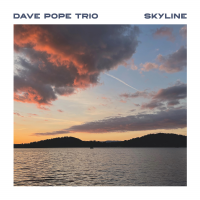Home » Jazz Articles » Interview » Terri Lyne Carrington: The Long Road
Terri Lyne Carrington: The Long Road
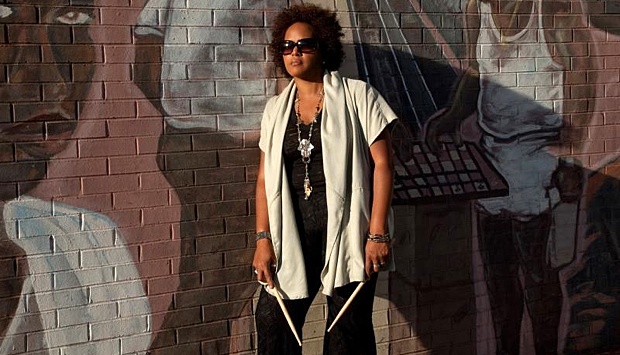

Charles Mingus
bass, acoustic1922 - 1979
She played a show with trumpeter

Clark Terry
trumpet1920 - 2015

Jack DeJohnette
drumsb.1942
For years now, she's been an in-demand drummer playing with all kinds of musicians, including pianist

Herbie Hancock
pianob.1940

Wayne Shorter
saxophone1933 - 2023
Carrington is one of the finest drummers on the scene, full of fire and invention, with the flexibility to fit just about any situation. It appears she was born to do it.
"There are a lot of really strong young players now," she says, looking back to her beginnings. "My father always kids me, 'It's a good thing you came along when you did,' meaning there are so many young players that are great at a young age. But the thing that I say back is, 'If I came along now I would be better.' Better at 10 now than I was at 10 then. Because there's so much more information. Times have changed and people are assimilating things a lot faster. It's the way society's moving. Just the invention of the internet, everything is faster. People learn faster."
She's pursued music her whole life, with formal education and the inevitable lessons acquired from other musicians, many of them masters. She's in an important place where she not only instills something special into other people's bands and other recording projects when she chooses to do so, but stands on her own as a serious artist—not just drummer—who has a lot to say.
"My whole life, I haven't really done anything else [but music] and I have no desire to do anything else," Carrington says. "What's interesting to me is sometimes it takes that kind of lifelong dedication to something. Which most strong musicians have. It takes that lifelong dedication and perseverance to come into your own and for things to come into fruition. It's what I felt like with The Mosaic Project and Money Jungle (Concord, 2013). Finally, all the things that I've done are coming together. I'm able to make sense of it all in some way."
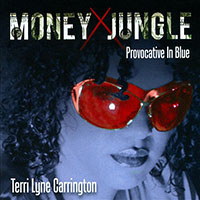 The latter reference is her album released this year, Money Jungle: Provocative in Blue. It's a superlative record that revisits the renowned album made 50 years ago, Money Jungle (United Artists, 1963), when the beyond-category pianist
The latter reference is her album released this year, Money Jungle: Provocative in Blue. It's a superlative record that revisits the renowned album made 50 years ago, Money Jungle (United Artists, 1963), when the beyond-category pianist 
Duke Ellington
piano1899 - 1974

Max Roach
drums1925 - 2007

Christian McBride
bassb.1972

Gerald Clayton
pianoCarrington first came upon the Ellington-Mingus-Roach record about 12 years ago in a record bin. She had never heard of it, even though it was among hundreds and hundreds of record her father had in his collection. "It was one that slipped past me," she notes. "Something about it. There was some magic about it that compelled me from the first time I heard it."
Some of the songs struck her as interesting enough to play, and she would incorporate the title track into set lists from time to time. Then, "One day I decided I wanted to cover this record. I don't know why, other than there was something magical and mystical that jumped out of that recording for me. I started hearing arrangements and things that I felt I could do with it." That included the feeling of the blues it exuded.
"To me, the blues thread is a big thread throughout all of that record, except maybe a couple songs. I'm talking about the newer songs. The ones [Ellington] recorded for that date, not 'Caravan' or 'Warm Valley.' I felt like that theme was important. I felt like [Ellington] was speaking to the people. The blues form is always a way to relay messages, traditionally. I won't say grassroots-based, but to me it was a record for the people. Max and Mingus were definitely radical guys. Guys that had no problem talking about what was going on during those times. To me, it was making a statement reflective of the times."
The approach she took to making her record was similar—for today, not a regurgitation. And it's successful. It has fresh sounds, intriguing interpretations. Bluesy and soulful and expertly carried out. Some tunes, like "Very Special," have a similar vibe to the original, though the individuality of the players carries the day. But Ellington's "Backward Country Boy Blues," introduced in 1963 by Mingus' resounding bass before Duke's heavy block chords, is a rumbling blues. On Provocative in Blue,

Nir Felder
guitar
Lizz Wright
vocalsb.1980
Interspersed here and there are voice-over snippets of people like Martin Luther King, Bill Clinton and others commenting on the role of money in society—basically how there are still too many have-nots and not much is being done about it. But it is a subtle part of the record. The outstanding music is what it's all about.
Carrington says that kind of money-struggle theme "goes through every time period. It's as relevant now as it was then. It will be as relevant another 50 years from now. I wasn't trying to belabor a point. I think in general the people, that are listening to Money Jungle, are people that feel that way. I didn't want to feel preachy, or preaching to the choir. It's really just a statement of things the way they are and what we all probably know and believe anyway."
Listeners will also believe in what is being put down by this outstanding band. "Christian [McBride] was always the person that popped in my head when I thought about doing it," says the drummer. "To me, he has that sound and delivery that works. He's also a contemporary musician. Interestingly too, he really enjoyed doing the date and the variety of music that is on there. He doesn't like to be in a box, thought about as just one kind of musician. He grew up playing all styles and has demonstrated that over the course of his career."
"Gerald Clayton, to me, is a young pianist that is so steeped in tradition. I don't know who else, young or old, could have played 'Switch Blade' like Gerald, paying tribute to the original and how Duke played it, but putting his own thing in there and quoting some of the lines Duke played. It's really an amazing performance. I don't know anyone who could have done that any better, as well as playing a more contemporary sounding thing. He's very modern and at the same time steeped in tradition."
They all met the goal of keeping it fresh and being themselves. "That's how I hear things," says Carrington. "I don't see the real point in trying to do something like it was done [in the past], To me, it's not a challenge, it's the way I naturally do it. The challenge is taking something that Duke Ellington wrote, putting your spin on it and feeling OK about it."
As a follow-up to a Grammy, it's a strong statement from a musician entering her prime years, as a player, composer and producer. (She's currently producing a new recording for singer

Dianne Reeves
vocalsb.1956
Born in Medford, Mass., she played the drums for about two years before starting to take lessons at about age 9. Around the house, her father was playing blues and jazz like

Jimmy Smith
organ, Hammond B31925 - 2005

Jack McDuff
organ, Hammond B31926 - 2001

Gene Ammons
saxophone, tenor1925 - 1974

James Brown
vocals1933 - 2006

Aretha Franklin
vocals1942 - 2018
But it wasn't all study. Her father, a saxophonist whose credits included playing with pianist

Fats Waller
piano1904 - 1943
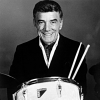
Louie Bellson
drums1924 - 2009

George Duvivier
bassb.1920

Jimmy Rowles
piano1918 - 1996

Eddie "Lockjaw" Davis
saxophone, tenor1922 - 1986

Al Cohn
saxophone, tenor1925 - 1988
After high school, Carrington went off to Berklee full time, then moved to New York City and started right in playing with Terry, who also appears briefly on the new Money Jungle recording, doing his Mumbles act, wordless vocalizing, on "Fleurette Africain." Adds Carrington, "He was the highlight for me [on the album]. It kind of brought my career full circle. My first professional gig was with Clark when I was 10. My first touring was with Clark when I was 18. For him to be on this CD was very special for me."
It was with the encouragement DeJohnette that she moved to New York in 1983. In the ensuing years, she worked with the likes of saxophonist

James Moody
woodwinds1925 - 2010

Lester Bowie
trumpet1941 - 1999
In the Big Apple, "I was playing around town. I started playing with the " data-original-title="" title="">New York Jazz Quartet, [pianist]

Roland Hanna
piano1932 - 2002

Frank Wess
saxophone, tenor1922 - 2013

Pharoah Sanders
saxophone, tenor1940 - 2022

Greg Osby
saxophoneb.1960

Geri Allen
piano1957 - 2017

Steve Coleman
saxophone, altob.1956

Gary Thomas
saxophoneb.1961

Robin Eubanks
tromboneb.1955

Cassandra Wilson
vocalsb.1955
Herbie Hancock is another major influence. She first met him by going back stage after seeing him in concert. "Then sometime around 18 or 19, somebody called me and told me to call him. He said, '[trumpeter]

Eddie Henderson
trumpetb.1940
The drummer played a fundraiser with Hancock, Shorter and [bassist]

Stanley Clarke
bassb.1951
"So things were very good at the time," she says. "From there, I just started playing with Herbie.
Just prior to her job with Hancock, she was playing with saxophonist

Stan Getz
saxophone, tenor1927 - 1991

Natalie Cole
vocals1950 - 2015
She did the gig anticipating it could grow into something more, which it did. After that, "We did Gershwin's World (Verve, 1998), which was a Grammy winner. Things were different. That started my longer association with him. I've played with him off and on for the better part of 10 years."
Of her tenure on Arsenio, she says, "It was great. It gave me national exposure. I was only on the show for four months, but most people think it was a lot longer. It was really a good thing for me. The thing is, you have to really like all styles. I played with Whitney Houston and Little Richard. People like that. New Kids on the Block; they were hot at the time. I enjoyed all that. When I did The Vibe TV show, a

Quincy Jones
arranger1933 - 2024

She says, "I'm 47 years young, so I'm looking to have more experiences. It's interesting for me. It's great to play with someone like Esperanza [Spalding], the next generation. I'm on her last two CDs. Those are important ventures for me as well. I like to stay current and I like to encourage younger artists and be a part of it. It helps me to grow."
And she is still growing as a drummer, influenced by everything around her. "Jack [DeJohnette] was definitely my biggest influence," she says of her approach to her instrument. "All the masters. All of them. But the one I keep returning to now, especially now that I'm teaching, is

Roy Haynes
drums1926 - 2024

Tony Williams
drums1945 - 1997
Carrington is at a point where she's always being called upon for her drumming abilities. But also, she has done production and songwriting collaborations with artists such as singers Gino Vannelli, Peabo Bryson, Reeves and others, including the song commissioned by the Atlanta Committee for the 1996 Olympic Games, "Always Reach for Your Dreams," that featured Bryson. This past April 19, she was musical director for a benefit concert at the Howard Theater in Washington, D.C., honoring

Chaka Khan
vocals"The way I do it is kind of crazy," she said about wearing the hat of producer. "I'm in that world with Dianne [Reeves] right now. It's a different kind of record for her. I love it. It's like directing. Creating a vision that you share with the artist, and making all the right calls to try to make it happen. I think drummers make good producers. At least it seems like they have.
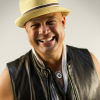
Narada Michael Walden
drumsb.1952

Lenny White
drumsb.1949
Carrington is in the driver's seat for a career that involves improvised music and segues into other styles that she enjoys. As for jazz, she says it's a music "that is ever evolving. I like all the different elements people are blending with it. When I go back and listen to [trumpeter]

Miles Davis
trumpet1926 - 1991
A life in music is a road that's always changing. It's a road that is not without its quick turns, accidents and maybe a bridge that might be temporarily impassable. Carrington continues to meet the challenges.
"It's funny, because I'm a teacher," she reflects. "My students, in their 20s, don't quite understand. I see it in some of them. But I want to look at them and say, 'It's a long road. You have at least another 20 years before you may even know who you are. Everybody's not like that, but a lot of us are."
Selected Discography
Terri Lyne Carrington, Money Jungle: Provocative in Blue (Concord Music Group, 2013)
Esperanza Spalding, Radio Music Society (Heads Up International, 2012)
Terri Lyne Carrington, The Mosaic Project (Concord Music Group, 2011)
Terri Lyne Carrington, More to Say (Real Life Story: Next Gen) (Koch Records, 2009)
Grace Kelly, Mood Changes (PAZZ Productions, 2009)
George Duke, In A Mellow Tone (Bizarre Planet Entertainment, 2006)
John Patitucci, Sketchbook (GRP, 2006)
Tineke Postma, For the Rhythm (215 Record, 2005)
Terri Lyne Carrington, Structure (ACT Music, 2004)
Terri Lyne Carrington, Jazz is a Spirit (ACT Music, 2004)
Wayne Shorter, Alegria (Verve, 2003)
Cassandra Wilson, Glamoured (Blue Note, 2003)
Greg Osby, Invisible Hand (Blue Note, 2000)
Michele Rosewoman, Quintessence (Enja, 2000)
Herbie Hancock, Gershwin's World (Verve, 1998)
Danilo Perez, Panamonk (GRP, 1996)
Dianne Reeves, Quiet After the Storm, (Blue Note, 1995)
James Moody, Moody's Party (Telarc, 1995)
Robin Eubanks, Different Perspectives (Polygram 1991)
John Scofield, Flat Out (Gramavision, 1989)
Terri Lyne Carrington, Real Life Story (Polygram, 1989)
Wayne Shorter, Joy Ryder (Columbia, 1988)
Photo Credit
All Photos: Courtesy of

Terri Lyne Carrington
drumsb.1965
Tags
Terri Lyne Carrington
Interview
R.J. DeLuke
United States
Charles Mingus
Clark Terry
Jack DeJohnette
Herbie Hancock
Wayne Shorter
duke ellington
Max Roach
Christian McBride
Gerald Clayton
Nir Felder
Lizz Wright
Dianne Reeves
Jimmy Smith
Jack McDuff
Gene Ammons
James Brown
Aretha Franklin
Fats Waller
Louie Bellson
George Duvivier
Jimmy Rowles
Eddie 'Lockjaw' Davis
Al Cohn
James Moody
Lester Bowie
New York Jazz Quartet
Roland Hanna
Frank Wess
Pharoah Sanders
Greg Osby
Geri Allen
Steve Coleman
Gary Thomas
Robin Eubanks
Cassandra Wilson
Eddie Henderson
Stanley Clarke
Stan Getz
Natalie Cole
Quincy Jones
Roy Haynes
Tony Williams
Chaka Khan
Michael Walden
Lenny White
Miles Davis
Comments
PREVIOUS / NEXT
Terri Lyne Carrington Concerts
Oct
8
Wed

Week I: Orrin Evans, Melissa Aldana, Robert Hurst &...
Smoke Jazz & Supper ClubNew York, NY
Oct
8
Wed

Week I: Orrin Evans, Melissa Aldana, Robert Hurst &...
Smoke Jazz & Supper ClubNew York, NY
Oct
9
Thu

Week I: Orrin Evans, Melissa Aldana, Robert Hurst &...
Smoke Jazz & Supper ClubNew York, NY
Oct
9
Thu

Week I: Orrin Evans, Melissa Aldana, Robert Hurst &...
Smoke Jazz & Supper ClubNew York, NY
Oct
10
Fri

Week I: Orrin Evans, Melissa Aldana, Robert Hurst &...
Smoke Jazz & Supper ClubNew York, NY
Oct
10
Fri

Week I: Orrin Evans, Melissa Aldana, Robert Hurst &...
Smoke Jazz & Supper ClubNew York, NY
Oct
10
Fri

Week I: Orrin Evans, Melissa Aldana, Robert Hurst &...
Smoke Jazz & Supper ClubNew York, NY
Oct
11
Sat

Week I: Orrin Evans, Melissa Aldana, Robert Hurst &...
Smoke Jazz & Supper ClubNew York, NY
Support All About Jazz
 All About Jazz has been a pillar of jazz since 1995, championing it as an art form and, more importantly, supporting the musicians who make it. Our enduring commitment has made "AAJ" one of the most culturally important websites of its kind, read by hundreds of thousands of fans, musicians and industry figures every month.
All About Jazz has been a pillar of jazz since 1995, championing it as an art form and, more importantly, supporting the musicians who make it. Our enduring commitment has made "AAJ" one of the most culturally important websites of its kind, read by hundreds of thousands of fans, musicians and industry figures every month.


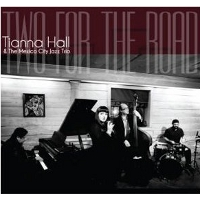
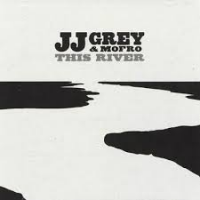

 Buy Now
Buy Now



